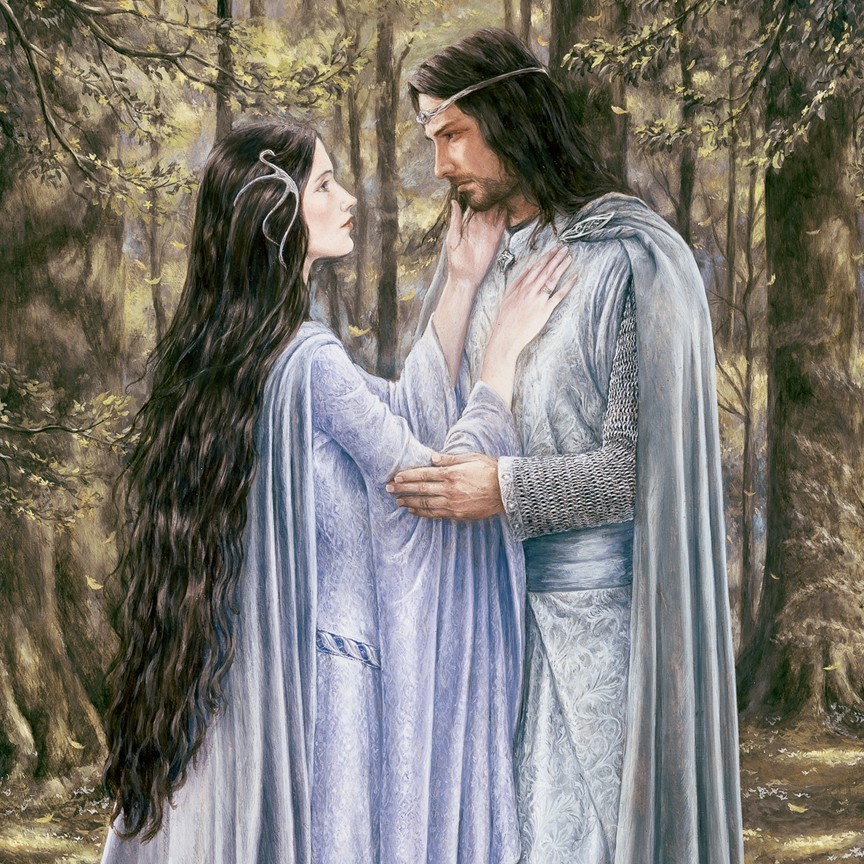The Two Towers by J.R.R Tolkien (Harper Collins 1991, 2007) pp. 847-851
You can almost feel the relief in Tolkien’s writing as Frodo and Sam leave the dreadful ash pits of the desolate lands before the Black Gate of Mordor and arrive in the fair land of Ithilien, which, although now under the control of the enemy, has not yet been spoiled.
Frodo and Sam, guided by Gollum, are making their way from the Black Gate down towards the crossing place in the road that runs south towards the sea and east-west from Minas Morgul to Osgiliath, the ancient but ruined capital of Gondor. And as they get further away from the horror of lands that have been utterly ruined by Mordor so their mood begins to change.

Ted Nasmith’s evocation of Ithilien.
Tolkien gives us a rich feast of language so that he can do justice to Ithilien, once the garden of Gondor, far enough from the shadow of the Ephel Death, the mountains of Mordor, to be free of them and yet sheltered by those same mountains from the east wind.
Tolkien was not a meteorologist and so he never discourses in detail about the weather in Middle-earth. His geography, and his meteorology too, is first and foremost mythological and so reflects the way in which the peoples of western Europe saw the world about them in the pre-modern world. The West and the great Atlantic ocean always made that direction one of mystery. In Tolkien’s Middle-earth it is the way to Valinor, the way that the Elves take on their journey to Valinor. It is the way to the Grey Havens, that are themselves a crossroads between worlds. In Europe the wind that comes from the West is warmed by the warm current coming out of the Gulf of Mexico and so it moderates the weather right up into the Arctic Circle in the far north of Norway and brings warm rain to the green lands of western Europe and especially, for Tolkien, to the British Isles that were his native lands.
The East, on the other hand, was always the direction from which danger and threat came. Invading armies always came from the East, whether Saxon, Viking or Norman in the British Isles, or the hordes coming out of the steppes of Central Asia, or the Ottoman Turks coming out of the East up the valley of the River Danube. And the weather that comes out of the East comes out of Siberia and there are no mountain ranges in Europe north of the Alps to provide shelter from the cold east wind or to provide defence from invading armies.
Ithilien is thus a land sheltered from the east and open to the south and west, a land of plenty, and Tolkien’s rich feast of language reflects this.
“Many great trees grew there, planted long ago, falling into untended age amid a riot of careless descendents; and groves and thickets there were of tamarisk and pungent terebinth, of olive and bay; and there were junipers and myrtles; and thymes that grew in bushes, or with their woody creeping stems mantled in deep tapestries the hidden stones; sages of many kinds putting forth blue flowers, or red, or pale green; and marjorams and new-sprouting parsleys, and many herbs and scents beyond the garden-lore of Sam.”

Ted Nasmith imagines seeing Ithilien for the first time coming from the north.
Readers will note the sheer length of that sentence with its profusion of semicolons and Tolkien’s pleasure in writing a list. Each shrub and herb is named until we arrive at the limit of Sam, the gardener’s, knowledge, and we are invited into the unknown, not as a place of danger, but a place to be explored so that new pleasures can be experienced and enjoyed. Tolkien sums it all up through a phrase in which, just for a moment, he leaves the language of the north and strays for a moment into the classical Mediterranean world.
“A dishevelled dryad loveliness.”
And Sam laughs, “for heart’s ease not for jest”. Frodo indeed laughed for jest in the ash pit before the Morranon when Sam recited his verse about the oliphaunt, and it lifted his spirit, breaking the spell of despair in which he was held in the long hours of that day. That laughter broke into his darkness but the dark still lay about him. Sam’s laughter is of a different kind. It is an expression of delight, the laughter of heaven. It is as if as Sam breathes in the rich scents of the garden, this is his outbreath.
So we come into the last place of refreshment for the hobbits before they enter the darkness of Mordor, a moment of grace before they are abandoned to the horror that they alone, unaided, must face. They do not know what lies before them but they are able to draw strength from this place because, unlike Gollum, this is how they have trained their hearts.















